Contents
IN HITLERS BUNKER
Armin D. Lehmann with Tim Carroll
This eBook is copyright material and must not be copied, reproduced, transferred, distributed, leased, licenced or publicly performed or used in any way except as specifically permitted in writing by the publishers, as allowed under the terms and conditions under which it was purchased or as strictly permitted by applicable copyright law. Any unauthorised distribution or use of this text may be a direct infringement of the authors and publishers rights and those responsible may be liable in law accordingly.
Epub ISBN: 9781780573021
Version 1.0
www.mainstreampublishing.com
Copyright Armin D. Lehmann and Tim Carroll, 2003
All rights reserved
The moral rights of the authors have been asserted
First published in Great Britain in 2003 by
MAINSTREAM PUBLISHING (EDINBURGH) LTD
7 Albany Street
Edinburgh EH1 3UG
ISBN 1 84018 896 0
No part of this book may be reproduced or transmitted in any form or by any other means without permission in writing from the publisher, except by a reviewer who wishes to quote brief passages in connection with a review written for insertion in a magazine, newspaper or broadcast
Every effort has been made to trace all copyright holders. The publishers will be glad to make good any omissions brought to their attention.
A catalogue record for this book is available from the British Library
Foreword

IN HITLER
S BUNKER IS BASED ON Armin Dieter Lehmanns account of growing up in Nazi Germany, fighting as a Hitler Youth against the Russians and ending the last days of the war serving in Adolf Hitlers bunker beneath the Berlin Chancellery Garden. Lehmanns narrative is compelling because it tells through the eyes of an innocent the story of the Nazi regimes genesis and subsequent nemesis. They were the youthful eyes that were dazzled by the visions of power and glory that Nazism seemed to offer a humiliated people. They were the uncritical eyes that witnessed the brutality of the Nazi regime without pausing to question its rectitude. They were eyes that remained blinded to the truth even as the shaky edifice of Hitlers Third Reich crashed down before them. It was only after his beloved Fhrer finally killed himself that Lehmann eventually opened his eyes and realised his childhood had been stolen.
Lehmann grew up in Silesia and went to school in Breslau where his father was in the SS. In the last days of the war he saw action against the Red Army outside Breslau. By a stroke of fate he was subsequently taken to Berlin to serve as the courier to Artur Axmann, the leader of the Hitler Youth. Axmann is virtually unknown outside Germany, but he was a pivotal figure in the Nazi hierarchy in the last years of the war, and became one of Hitlers closest confidants in his final hours. He had been promoted to Hitlers inner circle by virtue of his offer to sacrifice every last Hitler Youth in the defence of the Fhrer and the Fatherland.
As Axmanns courier Lehmann worked in the bunker complex beneath the Reich Chancellery where Hitler spent his last days. The experience brought the 16-year-old boy into contact with some of the most notorious Nazis of Hitlers regime, including the Fhrer himself. Lehmann was by Axmanns side as the drama of Hitlers last days unfolded. In Axmanns biography, the former Reich Youth leader recalled how Eva Braun had been impressed by the dedication of his Melder (courier), Armin Lehmann, whom she met in the bunker.
Axmann was a fanatical Nazi until his dying day. Lehmann has come to have a radically different perspective on life, and became a pacifist, appalled at the atrocities that the Nazis inflicted on mind and body. Lehmanns own memoir, Hitlers Last Courier, is a highly personal effort to explore his upbringing in a fanatical Nazi family. It was an effort that Lehmann himself admits he found difficult and his memories proved to be far from perfect. His memories do not always coincide with established history. Whenever possible I have checked the facts, but sometimes the facts have proved elusive. In Hitlers Bunker, which is based on Armins memoir, is partly the story of Lehmanns early life, and partly a historical account of those last days in the bunker.
Tim Carroll
Introduction

AS I THINK OF LIFE , I focus on ethics, moral values and embrace humanity as a whole. This has not always been the case. I had not only been taught but I had been conditioned, as a child, to think of myself as a superior being.
As I think of life, I search for meaning. All of the worlds major religions are outdated. Beliefs no longer promote reality. There is a heaven and there is a hell. Heaven, a state of mind, is unconditional love and hell is war as I had to experience when I was 16 years old.
At that age, I had never heard of unconditional love. My leader ordered me to kill. War for all peoples is a legalized event. My leader happened to be a mass-murderer. I didnt know it then. I had been taught Providence guided him. Providence? Destiny? Gods will?
If never allowed to question authority, if always taught to obey parents, teachers, officials what would I become? A follower of someone disguised, a follower of a mass-murderer possessed by madness, a follower of Adolf Hitler?
Once an idol, he had taught us that we belonged to a superior race! He had misled us. There are superior human beings regardless of race. Where can we find them? All over the world. Where people care for each other, where reverence for life is paramount, physical well-being and mental well-being.
We had been taught from earliest childhood to surrender ourselves to Fuehrer (leader), Volk (nation) and Vaterland (fatherland), without regard for the lives of others, let alone our own.
Having had distinguished myself in battle, I had been honored. The higher the elevation, the nearer to death I had come. The Iron Cross II (second class) I had been awarded, signified the meaning of a death cross! From the Volkssturm (Homeland Defense Force), our entire unit had been elevated to the Waffen-SS to make up for the losses of those who had received special training. We had not. But as members of the Hitler Youth movement there was no doubt that we would fight until death for the Fuehrer, without questioning what he was still living for and what we were still fighting for.
Reich Youth Leader Artur Axmann had personally selected me to be presented to Hitler and I felt proud before and ashamed after the war had ended. Declared to have belonged to a criminal organization felt like going on living with a chopped up soul. Eventually, had the papers certifying the awards not turned to ashes or dust, they certainly would not have been framed or displayed, not with the shape of my minds transformation.
Axmann emerged as one of only a handful of Hitlers followers, who to the very end enjoyed the Fuehrers trust and confidence as did Martin Bormann who had assumed chief of staff duties and the cynical Progapanda Minister Joseph Goebbels.
Why had Axmann personally selected me in a group of Hitler Youth to be presented to Hitler on the occasion of his 56th birthday? Aside from bravery, my recent distinction in having fought the Russians as a Melder (courier) might have contributed. Hitler had been awarded the Iron Cross as a courier in WW I. It added pride and I hoped that the event would be shown in the newsreels and that my father would see it.

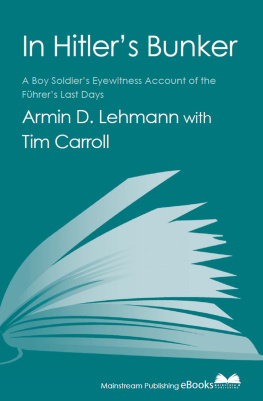

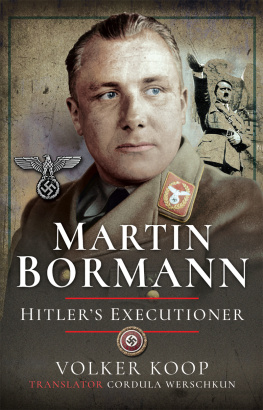

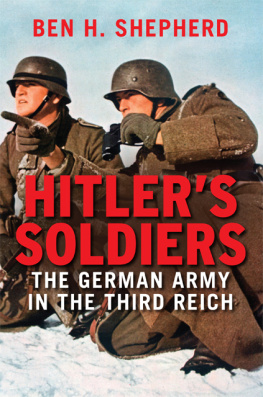
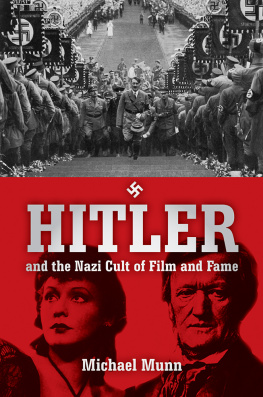
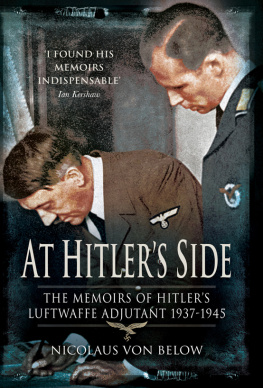




 IN HITLER S BUNKER IS BASED ON Armin Dieter Lehmanns account of growing up in Nazi Germany, fighting as a Hitler Youth against the Russians and ending the last days of the war serving in Adolf Hitlers bunker beneath the Berlin Chancellery Garden. Lehmanns narrative is compelling because it tells through the eyes of an innocent the story of the Nazi regimes genesis and subsequent nemesis. They were the youthful eyes that were dazzled by the visions of power and glory that Nazism seemed to offer a humiliated people. They were the uncritical eyes that witnessed the brutality of the Nazi regime without pausing to question its rectitude. They were eyes that remained blinded to the truth even as the shaky edifice of Hitlers Third Reich crashed down before them. It was only after his beloved Fhrer finally killed himself that Lehmann eventually opened his eyes and realised his childhood had been stolen.
IN HITLER S BUNKER IS BASED ON Armin Dieter Lehmanns account of growing up in Nazi Germany, fighting as a Hitler Youth against the Russians and ending the last days of the war serving in Adolf Hitlers bunker beneath the Berlin Chancellery Garden. Lehmanns narrative is compelling because it tells through the eyes of an innocent the story of the Nazi regimes genesis and subsequent nemesis. They were the youthful eyes that were dazzled by the visions of power and glory that Nazism seemed to offer a humiliated people. They were the uncritical eyes that witnessed the brutality of the Nazi regime without pausing to question its rectitude. They were eyes that remained blinded to the truth even as the shaky edifice of Hitlers Third Reich crashed down before them. It was only after his beloved Fhrer finally killed himself that Lehmann eventually opened his eyes and realised his childhood had been stolen.